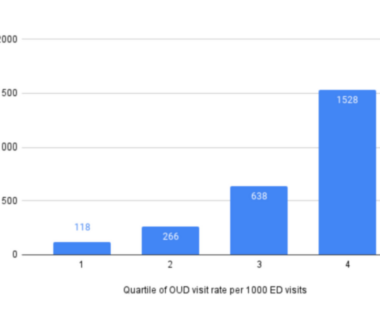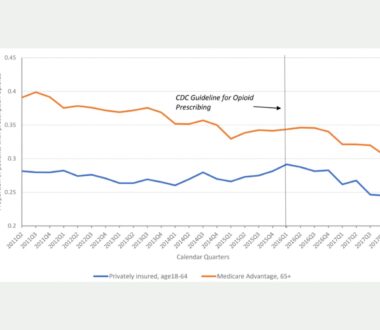
New Study Reveals Preventable-Suicide Risk Profiles
Individuals with physical health concerns made up the largest and fastest growing of five subgroups of individuals who died by suicide n the United States over roughly twenty years, according to an analysis led by Weill Cornell Medicine in collaboration with Columbia University, UC Berkeley School of Public Health, the University of Hong Kong and […]

Initiation of Hepatitis C Treatment Low Among Medicaid Recipients
While there are highly effective treatments for the hepatitis C virus (HCV), only 1 in 5 Medicaid enrollees diagnosed with HCV started treatment, according to a retrospective study led by researchers at Weill Cornell Medicine and Cornell University’s Ithaca campus. The findings revealed that treatment uptake rates were even lower among people under 30, women, […]

Prevalence of HIV Preexposure Prophylaxis Prescribing Among Persons with Commercial Insurance and Likely Injection Drug Use
The United States has made important strides to reduce the incidence and negative outcomes of HIV, including increasing the availability of effective treatment and prevention in the form of pre-exposure prophylaxis (PrEP). While the incidence of new HIV infections fell significantly from 130,000 in 1985, progress has stalled at approximately 39,000 new infections per year […]

Evidence for Supportive Prenatal Substance Use Policies
Increased prevalence of illicit substance use during pregnancy in the past decade has renewed national attention to prenatal substance use policies (PSUPs). Currently, there are punitive policies that criminalize drug use during pregnancy or define prenatal substance use as child maltreatment in child welfare statutes. If newborns are found to have prenatal exposure to substances […]

Providing Naloxone in the Emergency Department Can Save Lives
Overdose deaths continue to be a national tragedy. More than 800,000 Americans died from an overdose between 1999-2019, and the annual rate of overdoses has increased dramatically during the pandemic, according to the latest data from the Centers for Disease Control and Prevention. Roughly 7 in 10 current overdose deaths involve opioids, which means that […]

Targeting Emergency Department Resources to Address the Opioid Epidemic
In a new study in the American Journal of Emergency Medicine, my colleagues and I estimate the number and distribution of emergency visits for opioid use disorder (OUD) across the country. We found that nearly 2/3 of all emergency visits for OUD occurred in 25% of EDs nationwide. Why is this important? Patients with OUD come to the […]

The Impact of Recreational Cannabis Laws and Cannabis Use Disorder Among Pregnant Patients
To date, the American College of Obstetricians and Gynecologists advises pregnant patients not to use cannabis because of the increased risks of health complications to the pregnant individual and the newborn. However, as states expand access to recreational or medical cannabis, there is growing evidence of increased cannabis use and positive perceptions of cannabis among pregnant patients. […]

Robust Prescription Monitoring Programs and Abrupt Discontinuation of Long-term Opioid Use
Prescription drug monitoring programs (PDMPs) are statewide databases that track controlled substances dispensed at retail pharmacies. Used by health care providers, public health officials, and other stakeholders, PDMPs have become a major tool in addressing unsafe opioid prescriptions. Robust features of PDMPs—including mandates that allow prescriber use of PDMP, data-sharing across states, and prescriber delegation of […]

Prescription Opioids Dispensed to Patients with Cancer with Bone Metastasis: 2011-2017
In the past decade, opioid prescribing in the United States has steadily decreased as federal and state officials implemented strict regulations on prescription opioids to address the opioid crisis. The downward trend sparked concerns of undertreating chronic pain and prompted the Centers for Disease Control and Prevention (CDC) to formally clarify that the 2016 CDC […]

Hepatitis C Treatment by Non-specialist Providers in the Direct-acting Antiviral Era
Direct-acting antiviral agents (DAAs), highly effective treatments for hepatitis C virus infection (HCV), transformed HCV therapy and made it easier for non-specialist providers to prescribe HCV treatment. Despite this simplification, many insurers include being a specialist as part of prior authorization requirements for DAA treatment. CHERISH Research Affiliate and former pilot grant recipient Shashi N. […]

Prescription Drug Monitoring Program Mandates Affect Use of Opioids to Treat Acute, Severe Pain
Prescription drug monitoring programs (PDMP) have been crucial tools to address unsafe opioid prescribing. High rates of prescribing stoked the flames of the opioid crisis in the early 2000s, but opioid prescriptions have steadily decreased over the past decade. Unfortunately, opioid-related deaths have continued to rise each year. Many states have enacted comprehensive mandates that all clinicians consult the PDMP […]

Characterizing Initiation, Use, and Discontinuation of Extended-Release Buprenorphine in a Nationally Representative United States Commercially Insured Cohort
Medications for opioid use disorder (MOUD) are evidence-based treatments that help people reduce or stop using opioids. However, high discontinuation rates of MOUD pose a barrier to reducing opioid-related overdoses. Extended-release buprenorphine (XR-BUP) is a relatively new MOUD, approved in late 2017, that has the potential to increase retention because of its monthly dosing schedule. Currently, there is […]
Engage with CHERISH
Submit a Consultation Request or Contact Us to learn more about how CHERISH can support your research or policy goals.